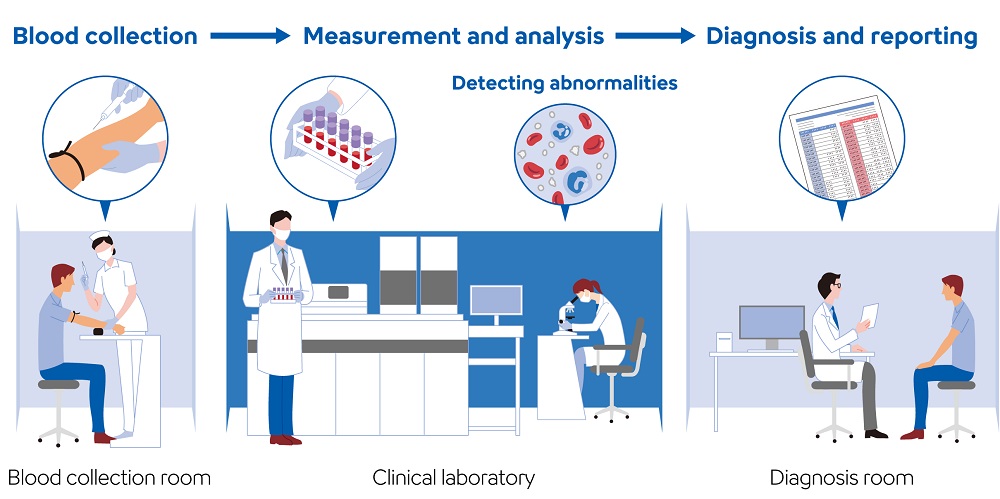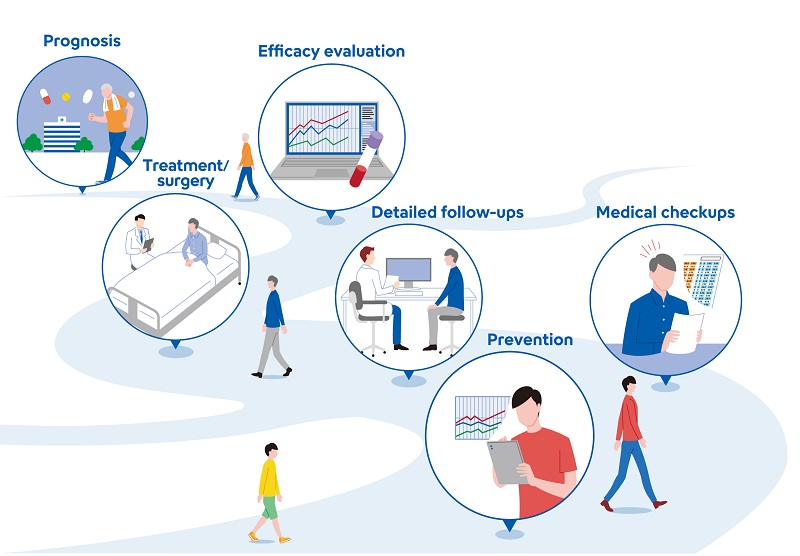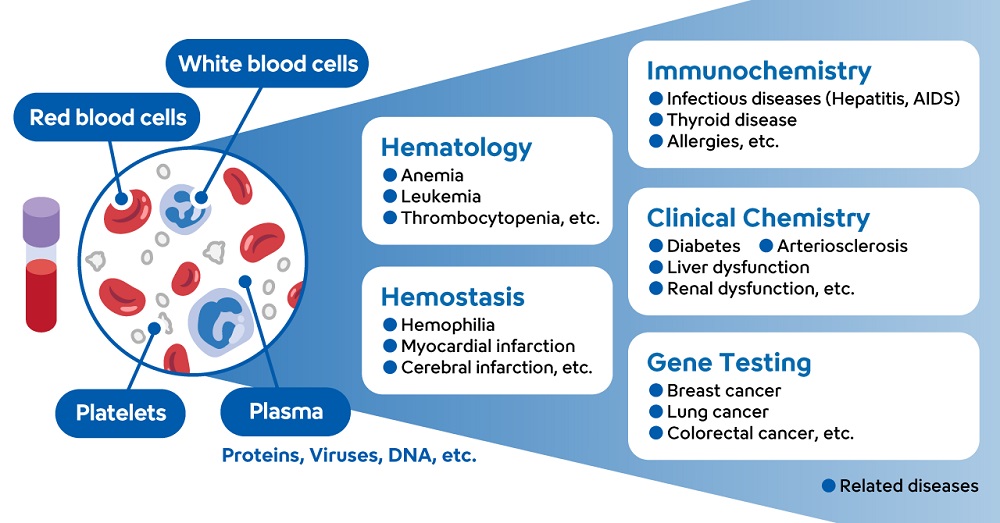Stories
Unveiling the Role and Mechanisms of Blood Testing: How Sysmex Supports Diagnostics in Healthcare
Have you ever wondered where the blood drawn during health checkups or hospital visits goes? Who performs the tests, how are they conducted, and why are blood tests so crucial? In this article, we explore the essential roles and processes of blood tests, and introduce the dedicated professionals and advanced equipment from Sysmex that support these vital diagnostic procedures.

Where Does Your Blood Go? From Collection to Test Results
Large hospitals have specialized clinical laboratories for testing. Certified laboratory professionals conduct these tests based on doctors’ instructions. The blood collected by nurses during medical examinations or health checkups is first sent to the clinical laboratory.1 The laboratory professionals place the blood-filled test tubes into advanced equipment, which automatically measures and analyses the samples, categorizing them as normal or abnormal. If abnormalities are detected, a laboratory professional may perform further investigations under a microscope. The test results are then sent to the doctor, who explains the diagnosis to the patient based on the test results and other clinical findings.
By promptly conveying accurate test results to doctors, laboratory professionals enable them to make accurate diagnoses and determine appropriate treatments. This timely information is crucial for the early detection and effective treatment of illnesses, ultimately improving patient outcomes.
- 1. Example of operations in large hospitals with in-house clinical laboratories

Clinical laboratories in hospitals are equipped with a wide range of advanced testing instruments, conducting numerous diagnostic tests every day to ensure accurate and timely results.
What Can a Blood Sample Reveal? Types of Blood Tests and Diseases They Detect
Tests that use samples collected from a patient’s body, such as blood or urine, to assess the patient’s health are known as “in vitro diagnostics.” These tests are essential in various medical scenarios, including preventative health check-ups, disease diagnosis, treatment strategy determination, and medication effect evaluation. In vitro diagnostics play a crucial role in quickly and accurately understanding the patient’s condition, facilitating diagnosis and treatment.

In vitro diagnostics conducted in various situations from prevention to prognosis
Even a small amount of blood contains a wealth of information for understanding the body’s condition and the causes of illnesses. Various types of tests include those that measure the number and size of red blood cells, white blood cells, and platelets to assess anemia and general health. Other tests examine the ease of bleeding and clotting, and tests that detect proteins (antibodies) produced to fight bacteria and viruses, aiding in the diagnosis of infectious diseases and other conditions.

Types of blood tests and the diseases they reveal
Sysmex: Leading Innovations in Testing Instruments That Are Essential in Diagnosis and Treatment
Column: The Revolutionary HS-Series Integrated Hematology System - Enhancing Efficiency and Safety in Clinical Laboratories -
In the late 1980s, medical institutions faced significant challenges due to rising healthcare costs and the emergence of infectious diseases such as AIDS. Addressing the critical needs for reducing the operating costs of clinical laboratories and ensuring the safety of laboratory professionals became paramount. In response, Sysmex developed the HS-Series Integrated Hematology System in 1990, marking the world’s first fully automated system for blood cell counting, white blood cell classification, reticulocyte measurement to assess bone marrow hematopoietic capacity, and preparation of blood samples for abnormal value investigation. This groundbreaking system automated the entire workflow of sample transportation and pre- and post-measurement manual processes, thereby significantly enhancing the efficiency of clinical laboratories and reduced the infection risks associated with blood handling. Sysmex’s HS-Series has made a substantial contribution to overcoming the challenges faced by clinical laboratories.

Conclusion
You Might Also Be Interested in These Articles
The Quest for a More Accessible Dementia Diagnosis
Tackling the Universal Threat of Antimicrobial Resistance (AMR) with New Testing Technology
Dedicated to Eliminating Malaria Through the Development of Diagnostic Devices
- 2. Sysmex promotes the concept of a “healthcare journey.” We view the various healthcare-related events a person experiences throughout their lives (life stages), along with the corresponding processes these involve (such as treatment at healthcare institutions), as a “journey.” Through various collaborations, we aim to offer new value, to make each individual’s healthcare journey better, and to grow as an essential presence in society. ”Healthcare journey” is a trademark of Sysmex Corporation, registered in Japan. ▶Short movie "About Healthcare Journey" (Sysmex Corporation’s Official YouTube Channel)
Related Keywords
- Information contained in the stories is current as of the date of the announcement,
but may be subject to change without prior notice.
